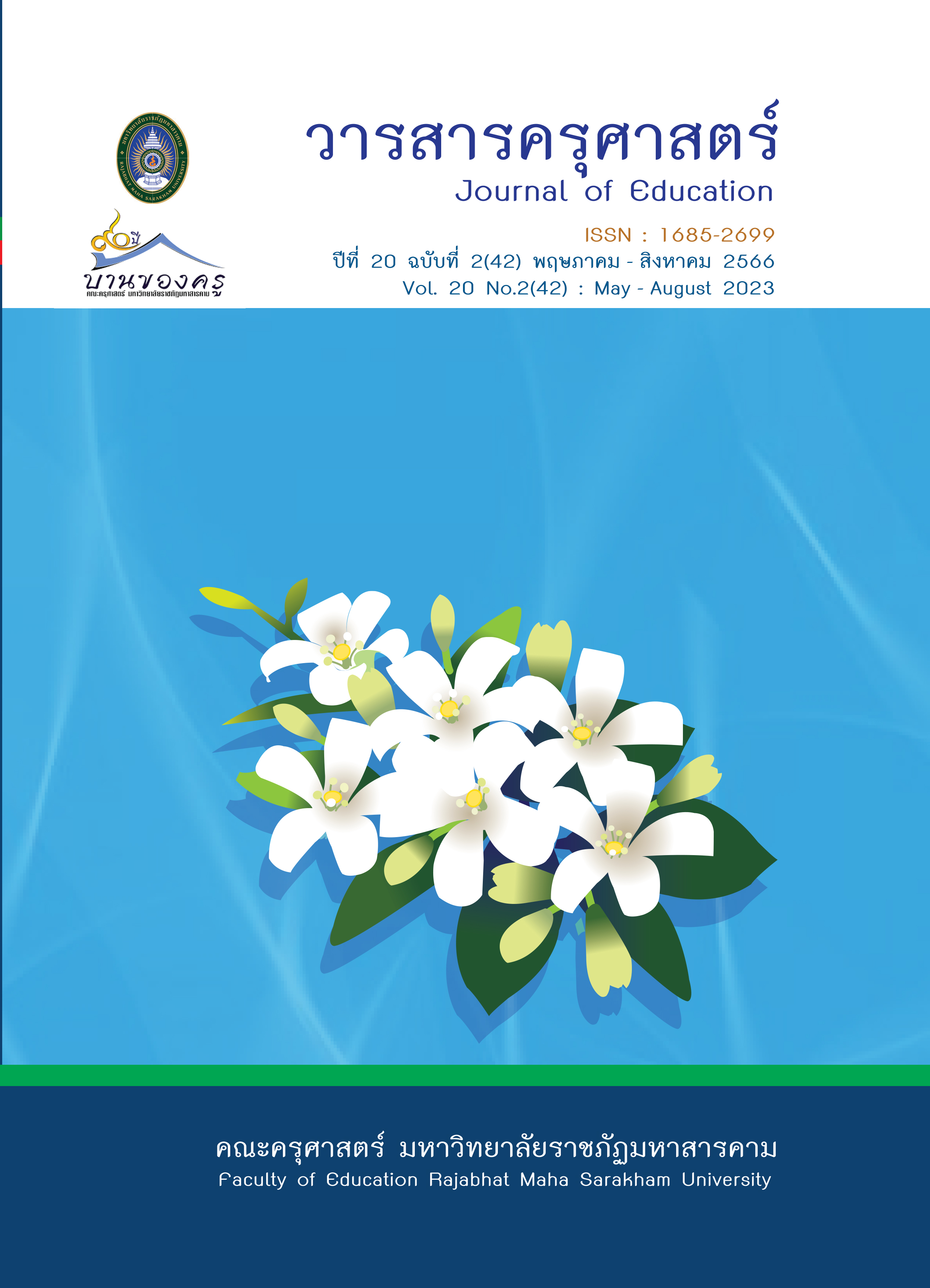Development of Social Skill and Self-Regulation Abilities for 6th Grade Students Based on Bandura Theory, Metacognition, Reasoning Approach and Collaborative Learning
Main Article Content
Abstract
The purposes of this study were to: 1) compare students’ social skills and self-regulation ability, during, before and after learning management based on Bandura theory, metacognition, reasoning approach, and collaborative learning and 2) compare the sample’ skill and self-regulation ability with the controlled group traditional approach students. This research methodology was the experimental research with random assignment to determine the experimental group and the control group consisted of 57, the 6th grade students in Sunthonwijit (Bamrungwittaya) school, Muang Nakhon Phanom District, Nakhon Phanom Province, the second semester, academic year of 2021. The sample used cluster random sampling method. The research instruments were 24 learning management plans, the 40-item Social Skill Evaluation Form, and the-20 items Self-Regulation Ability Evaluation Form. The research statistics were mean, standard deviation, percentage, t-test (dependent sample), and F-test (One-way MANOVA).
The results of the research revealed that: 1) the students’ learning achievement scores after learning with the model were higher at the statistical significant as .05 level., and 2) the sample’s achievement scores also earned higher than the controlled learning traditional approach students at the statistical significant at .05 level.
Article Details

This work is licensed under a Creative Commons Attribution-NonCommercial-NoDerivatives 4.0 International License.
ข้อกำหนดเบื้องต้นที่ผู้นิพนธ์(ผู้ส่งบทความ) ควรทราบ
1. ผู้นิพนธ์ที่ประสงค์จะลงตีพิมพ์บทความกับวารสาร ตั้งแต่เดือนมกราคม 2563 เป็นต้นไป ให้ใช้รูปแบบใหม่ (Template 2563) โดยสามารถดูตัวอย่างได้ที่เมนู GUIDELINES
2. จะตีพิมพ์และเผยแพร่ได้ ต้องผ่านการประเมินจากผู้ทรงคุณวุฒิ (Peer Review)
3. การประเมินบทความโดยผู้ทรงคุณวุฒิ (Peer Review) เป็นแบบ Double Blind
4. การอ้างอิงบทความใช้หลักเกณฑ์ APA (American Psychological Association) คลิก
5. บทความถูกปฏิเสธการตีพิมพ์ ไม่ผ่านการประเมิน ผู้นิพนธ์ขอยกเลิกเองหรือชำระเงินก่อนได้รับการอนุมัติ ทางวารสารไม่มีนโยบายการคืนเงิน
References
กระทรวงศึกษาธิการ. (2551). หลักสูตรแกนกลางการศึกษาขั้นพื้นฐานพุทธศักราช 2551. กระทรวงศึกษาธิการ.
สำนักวิชาการและมาตรฐานการศึกษา. (2553). แนวทางการจัดการเรียนรู้ตามหลักสูตรแกนกลางการศึกษาขั้นพื้นฐาน พุทธศักราช 2551. โรงพิมพ์ชุมนุมสหกรณ์การเกษตร แห่งประเทศไทย จำกัด.
Bandura, A. (1997). Self-efficacy: The exercise of control. W. H. Freeman & Company.
Broadhead, P., Johnston, J., Tobbell, C., & Woolley, R. (2010). Personal, Social and Emotional Development. (Supporting Development in the Early Years Foundation Stage). Continuum.
Buhl, J., Sumpter, D. J., Couzin, I. D., Hale, J. J., Despland, E., Miller, E. R., & Simpson, S. J. (2006). “From disorder to order in marching locusts,” Science. 312(5778): 1402–1406.
Charles, C.M. (2002). Building classroom discipline (7th ed.). Allyn and Bacon
Coon, D. & Mitterer, J. O. (2011). Psychology: A Journey (4th ed). Belmont, CA: Wadsworth, Cengage Learning.
D’Andrea, J. M., & Ivey, M. B. (2012). Theories of counseling and psychotherapy: A multicultural perspective. CA: Sage Publication.
Dignath, C. & Veenman, M.V.J. (2021). The Role of Direct Strategy Instruction and Indirect Activation of Self-Regulated Learning—Evidence from Classroom Observation Studies. Educ Psychol Rev 33, 489–533 (2021). https://doi.org/10.1007/s10648-020-09534-0.
Elliott, S. N. (1993). Social Skills Rating System. Circle Pines, MN: American Guidance Service.
Flavell, J.H. (1979). “Metacognition and Cognitive Monitoring: A New Area of Cognitive Developmental Inquiry,” American Psychologist.
Gredler, M. E. (1997). Learning and Instruction: Theory into Practice (3th ed). Merrill an imprint of Prentice Hall.
Gregory, G. H. & Kuzmich, L. (2005). Differentiated Literacy Strategies for Student Growth and Achievement in Grade 7-12. Thousand Oaks, CA: Corwin Press.
Gresham, F. M. (2006). Social skills training for teaching replacement behaviors: Remediating acquisition deficits in at-risk students. Behavioral Disorders, 31(4), 363-377.
Griffith, P. L., &Ruan, J. (2005). What is metacognition and what should be its role in literacy instruction? In S. E. Israel, C. C. Block, K. L. Bauserman, & K. Kinnucan-Welsch (Eds.), Metacognition in literacy learning. (pp. 3–18). Mahwah, NJ: Lawrence Erlbaum Associates, Inc.
Gudwin D. M., Salazar-Wallace M. D. (2010). Mentoring and coaching. Thousand Oaks, CA: Corwin. Google Scholar. Guyton E., Hidalgo F. (1995).
Johnson, D.W. and R.T. Johnson. (1990). Learning Together and Alone: Cooperative, Competitive and Individualistic Learning. 2nd ed. New Jersey: Prentice-Hall.
Johnson, D.W., & Johnson, R.T. (1994). Learning Together and Alone. Cooperative, Competitive, and Individualistic Learning. (4th ed.). Edina, Minn.: Interaction Book Company
Kamaruddin, S. and Yusoff, N. (2019) The Effectiveness of Cooperative Learning Model Jigsaw and Team Games Tournament (TGT) towards Social Skills. Creative Education, 10, 2529-2539. https://doi:10.4236/ce.2019.1012180.
Kassin, S. Steven, F. & Markus, H.R. (2011). Social Psychology (8th ed). Belmont, CA: Wadworth, Cengage Learning.
Kimmel, M. S. (2002). “Gender Symmetry” in Domestic Violence: A Substantive and Methodological Research Review. Violence Against Women, 8(11), 1332–1363. https://doi.org/10.1177/107780102237407.
Mandell, A., & Herman, L. (2009). Mentoring: When Learners Make the Learning. In J. Mezirow, E.W. Taylor, & Associates (Eds.). Transformative Learning in Practice: Insights from Community Workplace and Higher Education. San Francisco: Jossey-Bass. 78-88.
Matson, J. L., Rotatori, A. F., & Helsel, W. J. (1983). Development of a rating scale to measure social skills in children: The Matson Evaluation of Social Skills with Youngsters (MESSY). Behaviour Research and Therapy, 21(4), 335–340. https://doi.org/10.1016/0005-7967(83)90001-3
Pintrich, P.R. (2000). Understanding Self-Regulated Learning. San Francisco: Jossey-Bass Publisher.
Prasetyo, I., Suryono, Y., & Gupta, S. (2021). The 21st Century Life Skills-Based Education Implementation at the NonFormal Education Institution. Journal of Nonformal Education, 7(1), 1-7.
Reeve, J., Ryan, R., Deci, E. L., & Jang, H. (2008). Understanding and promoting autonomous self-regulation: A self-determination theory perspective, In D, H, Schunk & B, J, Zimmerman (Eds.), Motivation and Self-regulated learning: Theory, research, and applications. (223-224). Erlbaum.
Slavin, R. E. (1993). Cooperative learning: Theory, research, and practice. Englewood Clilffs, NJ: Prentice Hall.
Zimmerman, B.J. (2000). ‘Attainment of self-regulation: A social cognitive perspective’, in Boekaerts, M., Pintrich P.R. and Zeidner, M. (eds.), Handbook of Self-regulation. San Diego, CA: Academic Press, 13–39.
Zimmerman, Barry J. (2011). “Motivational Sources and Outcomes of Self-Regulated Learning and Performance.” in Handbook of Self-Regulation of Learning and Performance. Barry J. Zimmerman and Dale H. Schunk (Eds.), Routledge, 49-64.


